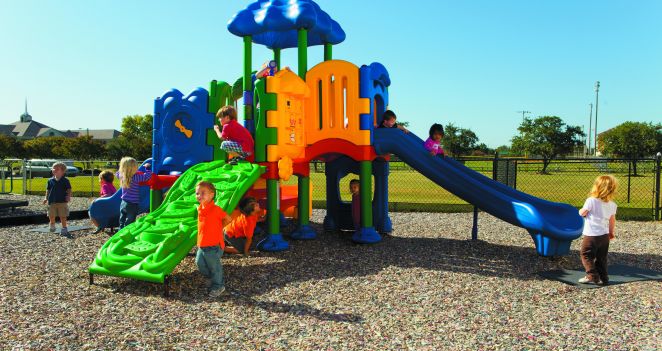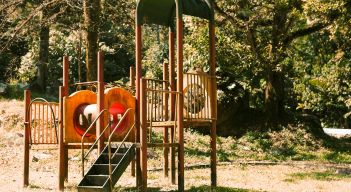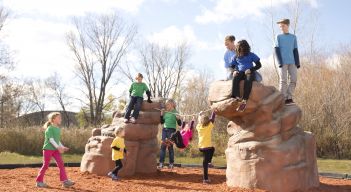
Why Do We Have Playgrounds?
“Children learn as they play. Most importantly, in play children learn how to learn.”
-O. Fred Donaldson
The Importance of Play
For generations, scientific research has continued to provide sound evidence for the importance of play in childhood development. Whether at the local park or at school recess, providing a place for a child to run, explore, and learn uninhibited allows them to build social skills, develop problem-solving abilities, and improve their physical strength.

Perhaps more than any previous generation, it is imperative that we, as adults, continue to advocate for designated playtime in schools and in our communities. This era is marked by simultaneous developments in technology, rises in childhood obesity, and a harsh reduction in public spending on recreation and creative programs in schools.
Physical Benefits
If you’ve spent any amount of time around children, you know that children can be quite energetic. Without a method of channeling that energy, children often are pushed to act out and behave erratically. It is absolutely necessary for children to have the opportunity to take a break, apply new knowledge, and push themselves physically each day.
Playground obstacles give children, often for the first time, the opportunity to understand movement and motor skills, and learn how their bodies and react and respond to different obstacles. For instance, activities like the swings, overhead equipment, such as monkey bars, help improve grip strength, hand-eye coordination, and upper-body strength. Daily physical activity also greatly reduces children’s risk of diseases such as diabetes and obesity.
Emotional Benefits
Many parents will tell you that there is a direct correlation between the state of their children’s mood after returning home from school and whether or not they were given time for physical activity and outdoor play that day.

It may not be the first thing that comes to mind when thinking about playgrounds, but a well-designed playground has the ability to challenge children to become more self-confident. By seeing their peers interact with obstacles or try more challenging maneuvers, children will be inspired to push past their limitations and unlock new potential.
Break Away from the Screens
Technology has advanced to stages that seemed impossible just a few years ago. Think about it! Cars can drive themselves, you can monitor your home from your smartphone, and most homes subscribe to at least one television streaming service. Kids have the amazing ability to adapt and learn this new technology seemingly as soon as it is unveiled; however, it is important to remember that screen time cannot replace the real-world experience of interacting with another human!

When given the opportunity to fully embrace creative, interactive, and free play, you will see your children light up with joy and imagination. Encouraging children to break the norm and get outside will greatly benefit them in their futures.
Personal Development
Personal development is equally important as social development in the life of a developing child. Just as playgrounds are phenomenal places for children to build social skills, playgrounds create a great environment for solitary play.
When a child has the time and space to interact with obstacles and challenges without the influence of other individuals, they are given a challenge and forced to rely on instinct, experiment, and hopefully make new discoveries!
Educational Benefit
The U.S. Department of Health & Human Services states that only 6 states require physical education in every grade, K-12. Despite this, research is regularly being done to prove the immense benefits of physical activity on learning, focus, and information retention.

Harvard Medical School’s Harvard Health Publishing recently released an article that states “exercise changes the brain in ways that protect memory and thinking skills.” In many schools, recess is amongst the first programs to be cut when restrictions are placed on budget or schedule. Although taking away recess maximizes time spent in the classroom, children may be less likely to retain the additional information without time spent outside and engaging in physical activity.
Time to Build a Playground Our team at UltraPlay is dedicated to helping you discover and build a playground that challenges and inspires children of all ages! Click here to contact one of our representatives, or check out our planning index which will walk you through every step from site preparation, making sure your playground is ADA accessible, installation, and every step in between!
